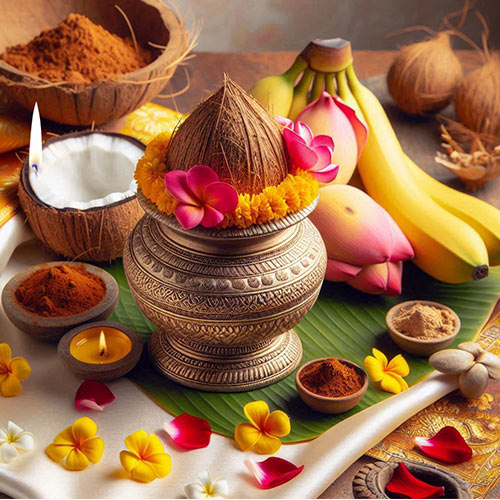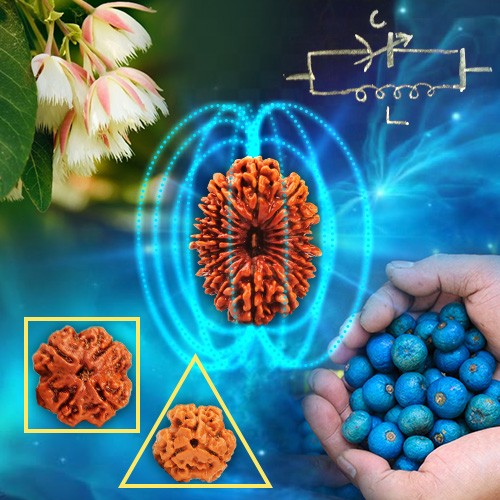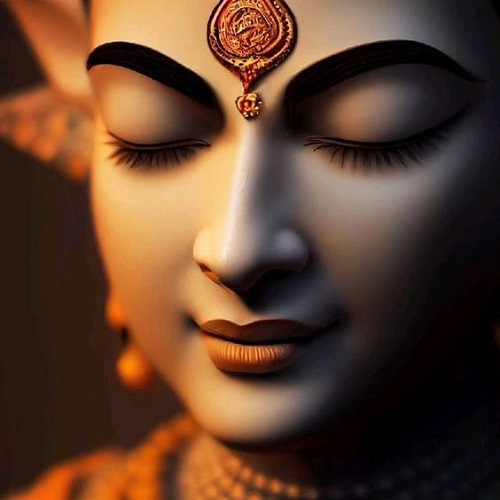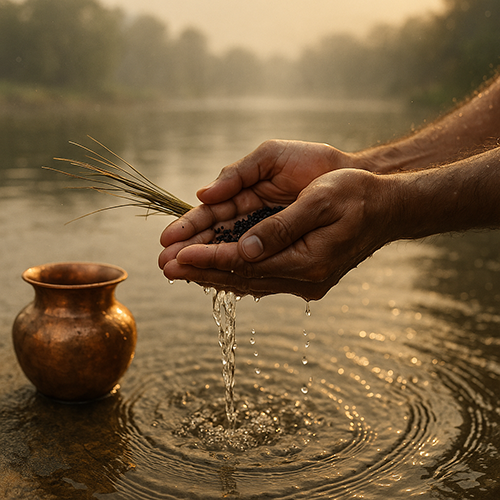Tulsi in Hinduism and Tulsi Vivah
Tulsi, the holy basil is a fragrant Indian herb that is highly revered in Hindu culture. Tulsi is worshipped as an incarnation of Goddess Lakshmi, the divine consort of Lord Vishnu. Its leaves are essential in the worship of Lord Vishnu and all his avatars, including Ram, Krishna and even Hanuman and Balaram.
Tulsi plant occupies the pride of place in most Indian households in the center of the courtyard or facing the house. It is also grown for medicinal purposes and for extracting tulsi oil.
Tulsi Benefits
In Hindu culture, the benefits of Tulsi plant are numerous. In addition to being a valuable medicinal herb, Tulsi plant is worshipped across India for its spiritual vibrations. According to the Padma Puran, a person who merely sees the Tulsi plant thriving in a home or garden is rid of all bad karma, including the sin of killing a Brahmin. The Puranas further state that
Lord Krishna
is happy to abide in a home where Tulsi Devi is present.
A home where Tulsi Devi is worshipped never falls on bad times, but becomes pure like a holy place. The mere fragrance of the tulsi plant is supposed to purify the surroundings. Tulsi is commonly consumed in Indian households in many forms. It is brewed in herbal tea, consumed as a dry powder, ground into paste and even mixed with ghee.
Tulsi as a Medicine
Apart from being a common kitchen herb, the Tulsi plant has several benefits in Ayurveda, where hundreds of medicinal concoctions are made using Tulsi leaf and Tulsi plant extracts. Essential oil from Karpoora tulsi is used for medicinal purposes and in making herbal cosmetics. Tulsi extract is used in Ayurveda for a variety of ailments ranging from flu, fever, and cough and cold to digestive disorders. It is also useful in treating skin allergies, sore throat, tooth aches and eye infections. The dried leaves of tulsi are mixed with stored grains to repel insects. In several parts of the country, Tulsi leaves are used as a mosquito repellent.
Legends of Tulsi in Hinduism
There are many stories about Tulsi in Hindu tradition. Tulsi was a Gopi who was besotted with Lord Krishna. When Krishna's consort Radha came to know of this, she cursed the Gopi. In another story, Krishna was once being weighed in gold. But all of Satyabhama's (one of Krishna's wives) gold could not outweigh Him. Then Rukmani, another consort of Krishna laid a single Tulsi on the gold, thus managing to tilt the scales. This shows the spiritual importance of the Tulsi leaves.
According to Puranic texts, Tulsi is an incarnation of Vrinda, the wife of demon Jalandhar and the most ardent devotee of Lord Vishnu. Vrinda was reborn as Tulsi after Lord Shiva slayed her husband, the demon Jalandhar, in a battle. Since Vrinda was a Vishnu devotee, Lord Shiva gave her a boon that she would be reborn as Tulsi, one of the greatest medicinal plants in the world. Lord Vishnu in turn, promised her that no prayer to Him would be complete without Tulsi leaves.
In another story, Tulsi was a pious woman who wanted to marry Lord Vishnu. However, Lakshmi, the Lord's consort became jealous and banished Tulsi to become a plant in earth. But Vishnu granted her a boon that she would grace him when he appears as Shaligram in temples and places of worship.
The Puranas state that a person who worships Tulsi with her eight names - Vrinda, Vrindavani, Viswapavani, Visvapujita, Tulasi, Puspasara, Nandini, and Krsna Jivani - enjoys the merits equivalent to performing an Asvamedha (horse) sacrifice.
Tulsi Puja
Tulsi is the eternal companion of Lord Vishnu and there are many benefits of doing Tulsi Puja. According to Padma Purana, Tulsi plant is the very essence of all worship and devotional activities. Every part of Tulsi, including the leaves, roots, bark, branches and flowers are steeped in spirituality. It is believed that Lord Krishna does not accept flowers, food, or sandalwood paste unless an offering of Tulsi leaves is made to him. A person who worships Lord Krishna daily with Tulsi leaves attains the results of all austerities, charity and sacrifice. Such a person has realised the essence of the scriptures and has no duties left. Such a worshipper will also release all his ancestors from the cycle of birth and death.
Tulsi was born on the full moon day in the month of Kartik and hence, this day and month is significant for her worship. Offering Lord Vishnu Tulsi leaves every day during Kartik will grant immense blessings to the worshipper. People light diyas (earthern lamps) every evening during Kartik and worship the Tulsi plant with incense, kumkum and sandal paste. The tradition is especially observed by Vaishnav households this month. People chant hymns of Tulsi and meditate on her.
What is Tulsi Vivah?
Tulsi marriage is an essential part of Tulsi worship. On Ekadashi (the eleventh day) of the waxing moon in the month of Kartik, worshippers perform Tulsi vivah, the ceremonial marriage of Tulsi with Krishna. The Tulsi Vivah puja vidhi is actually the recreation of a traditional Hindu wedding ceremony conducted in the house or a temple.
Tulsi marriage ceremony begins in the evening and worshippers performing this puja observe a fast until then. This is because it is believed that the soul of Vrinda lives in Tulsi plant at night and leaves in the morning. A wedding mandap is installed in the courtyard where the Tulsi plant resides. The bride Tulsi is bathed and dressed in a red sari and decked with jewellery. Sometimes, a paper human face may be put on Tulsi to give her a human touch. The groom is usually an image or idol of Vishnu or Krishna or even a Shaligram stone, bathed and wrapped in a dhoti.
For the ceremony, the bride and groom are decked with flowers and garlands before being linked with a sacred cotton thread. Mantras of the traditional Hindu wedding ceremony are recited and rice and kumkum is sprinkled on the couple. Most of the Tulsi Vivah puja vidhi is performed by women worshippers. The Tulsi bride is then offered gifts of sari, jewellery, sweets and even a mangal-sutra. The marriage ceremony is followed by a traditional wedding feast. The significance of Tulsi Vivah is that it marks the beginning of the annual marriage season in India.
Tulsi Mala Benefits
In Hindu tradition, Tulsi Mala beads are the favourite of Lord Krishna. In Vishnu Purana, the Lord says that anyone who wears Tulsi beads around their neck will attain Him, even though the person is of bad character. Vaishnavas wear the mala around their neck after first offering to Lord Vishnu.
The Skanda Purana states that the wearer of Tulsi beads is among the most favoured devotees of the Lord. No matter how much bad karma a person has accrued, if he wears tulsi beads around his neck with devotion, he will manage to please the Lord. Such a person need not practice any other rituals for atonement and is freed of his past sins.
In modern times, the wearer of tulsi mala can expect to attain peace of mind and reduce stress in addition to purifying their body. As per Ayurveda guidelines, Tulsi mala is beneficial for healing throat disease.
Procedure for Wearing Tulsi Mala
Tulsi mala beads come in many varieties, the essential ones being black tulsi beads and white tulsi beads. You may use whichever you like but ensure that you buy original tulsi mala from a reliable source. After presenting the mala at the feet of Shri Krishna, you must purify it with pancha-gavya. Once you have done this, recite the Gayatri mantra eight times to charge the mala. Worship the mala with incense and chant the following Sadyojata-mantra:
Om sadyojatah prapadyami sadyojataya vai namo namah Bhave tave nadi bhave bhajeswamam bhavod-bhavaya namah
Pray to the Tulsi mala, saying: O Tulsi mala, you are loved by the Vaishnavas . I wear you around my neck; make me dear to Sri Krishna.



-in-Astrology.jpg)






.jpg)

.png)

Shashi
|November 23, 2023
Excellent understanding for those who never heard of Tulsi Viva